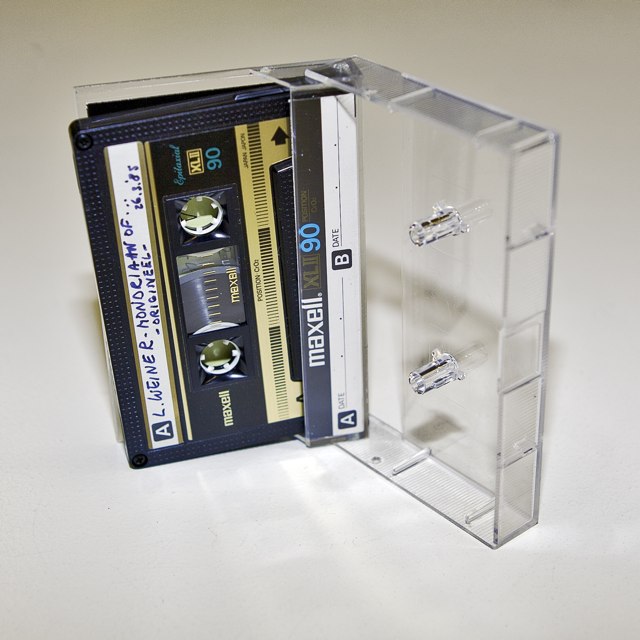Mondriaan of Volendam
26.03.1985
de Appel, Brouwersgracht 196, Amsterdam
de Appel, Brouwersgracht 196, Amsterdam
‘Op 26 maart 1985 om 20.00 uur zond Hilversum I in Het Evenement van de VPRO onder regie van Wim Noordhoek een programma van Lawrence Weiner uit. Door telefonisch bereikbaar te zijn en uitspraken over beeldende kunst uit te zenden nodigde Lawrence Weiner het Nederlandse radiopubliek uit deel te nemen aan het programma Mondriaan of Volendam. Marianne Brouwer, conservator Kröller-Müller Museum en Paul Groot, hoofdredacteur Museumjournaal waren ook in de studio aanwezig om vragen van luisteraars te beantwoorden. Opmerkingen en vragen van heel verschillende aard werden afgewisseld met teksten en klankcollages van Lawrence Weiner. [Hieronder volgen enkele fragmenten uit Mondriaan of Volendam.]
Michael Gibbs: ‘I want to ask you some questions about the desires of the need of the present esthetic: what are the present needs of ‘a new esthetic’?’
Lawrence Weiner: ‘Needs of a new esthetic? To understand the situation as it stands for real with materials.’
MG: ‘And a further question: you spoke of art as being a service industry, is one of these services to be an effective form of opposition to certain aspects of that society?’
LW: ‘Absolutely and with the greatest quality that’s at all possible.’
MG: ‘And how does that tie with the increasing commodification of art within society?’
LW: ‘I think that the increasing commodification is just a reflection of the normal situation in the economy right now and has very little to do specifically with art; it has happened to everything; we cannot fight against that.’
MG: ‘You don’t see any way to fight against it.’
LW: ‘We can fight against it, but at this point I don’t have a solution. It is a difficult problem.’
Luisteraar: ‘Waarom gebruik je in die ene tekst in Middelburg de uitdrukking ‘het verlangen naar een nieuwe esthetica’?’
LW: ‘The new esthetic is not really a mode, but it’s a new understanding, after somebody makes a presentation that helps you to understand, you must go further….’
Luisteraar: ‘Waarom wordt kunst in het algemeen zo duur verkocht?’
LW: ‘Het leven is ook duur en je hoeft er niet altijd voor te betalen als het in een museum te kijk hangt. En kunstenaars moeten toch ook eten? Ik vind dat trouwens geen vraag over kunst.’
Luisteraar: ‘Waarom niet, als ik het in mijn huis heb willen hangen?’
LW: ‘Je kan in Nederland kunst lenen, dat is niet duur, je kan er ook voor sparen. Dat moeten kunstenaars ook als ze iets nieuws willen bouwen. Al mijn werk staat trouwens in boeken afgedrukt, die je voor 20 a 25 gulden kan kopen.’
Luisteraar: ‘Waarom noemt u uw werk ‘sculptures’ en niet gewoon schilderijen, poëzie of kunstfilosofie?’
LW: ‘Dat is niet moeilijk te beantwoorden: het zijn namelijk wel sculpturen, want ze geven de relatie van voorwerp tot voorwerp aan en dat is de idee en de bedoeling van een sculptuur. Tegen ‘poëzie’ heb ik niets maar dat is alleen resonantie en tempo. Elk werk van mij is misschien ook wel een poëtische sculptuur. Ik vind het geen slecht woord, poëzie, maar ik ben geen poëet, want die houdt zich bezig met de relatie van mensen tot mensen.’
Luisteraar: ‘Kan kunst genezen?’
LW: ‘Ziekte is niet altijd fysiek. Kunst geeft een soort inzicht in de relatie van mensen tot voorwerpen. Het kan wel helpen als iemand totaal bang voor het leven is, maar het kan niet genezen.’
Luisteraar: ‘What I want to ask - referring to the previous gentleman - is, that I believe that art really can heal, as a matter of fact I am convinced of it for I see art as very spiritual. I do believe that one can really reach a certain level when one is creating.’
LW: ‘I don’t know. I hate to sound so cynical about it but art is really just a presentation of what people do when they work in relation to objects…. Yes a little knowledge can help you feel better about yourself. But that’s not the function of art. There’s a statement that comes up at one time: just because you're in the garage, doesn’t make you an automobile. Art functions as a metaphore and art functions as something that helps people to live better, but that’s not really its purpose and it’s almost like human beings function as soldiers or whores, but the definition of human being is not soldier or whore! So if art can help you to feel better about your situation, I don’t see any problem there, it is not misusing art. But there is a whole point that I think you’re missing in what constitutes art. Art really lets you understand your world rather than understand yourself.’
Luisteraar: ‘Do you believe that to be also the creator of art I mean….’
LW: ‘I prefer the word ‘maker’ as I said in the beginning of the program - ‘ik maak het’. I believe people make it, anybody could be an artist but it’s a ‘beslissing’, it’s a choice. If you chose to be an artist you do research and you do work into art. But I don’t think I create, it all was there before. I am a lucky person, I decided to be an artist at a certain age and I spent most of my time looking at the relation between myself and a piece of glass or the relation of myself and a colour.’’
('Mondriaan of Volendam', De Appel, 5 (1985) 2, pp. 28, 29.)

